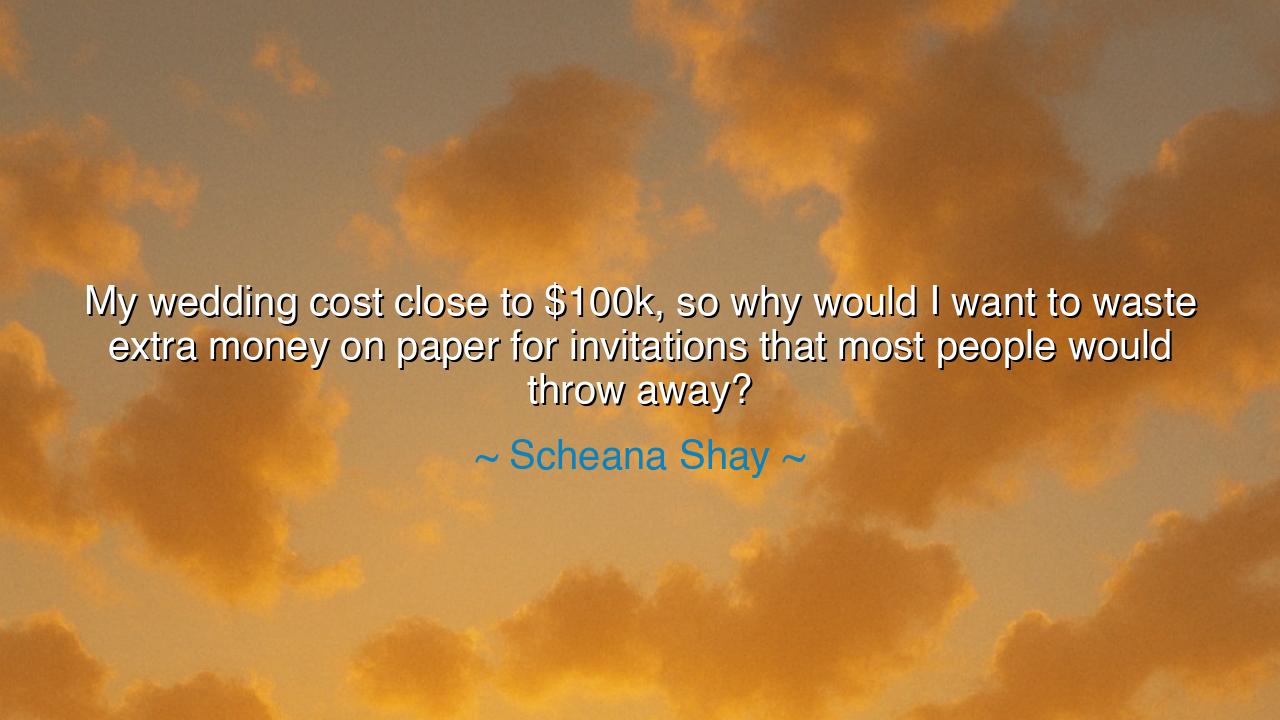
My wedding cost close to $100k, so why would I want to waste
My wedding cost close to $100k, so why would I want to waste extra money on paper for invitations that most people would throw away?






Hearken, O seekers of prudence and the art of measure, to the words of Scheana Shay, the voice of modern reflection and practicality: "My wedding cost close to $100k, so why would I want to waste extra money on paper for invitations that most people would throw away?" In this utterance lies the ancient truth that wisdom is found not only in grandeur, but in discernment, frugality, and the thoughtful allocation of resources. True value is revealed when one balances splendor with sense, understanding that extravagance without purpose is folly.
In the theater of human celebration, many are tempted to lavish beyond reason, measuring worth by the ostentation of objects rather than the meaning of the occasion. Shay illuminates that discernment preserves both wealth and purpose. To spend unwisely on symbols that vanish into disregard is to honor the ephemeral over the enduring, whereas careful stewardship ensures that resources strengthen what truly matters: experience, memory, and connection.
Consider the example of Cincinnatus, the Roman patrician and statesman, who was called from his plow to lead Rome in crisis. Though offered grandeur and command, he returned promptly to his simple farm once duty was fulfilled. His life illustrates the principle that value lies in substance, not in superficial display, and that wisdom often manifests in the careful, judicious use of what one possesses. True honor is measured by purpose and action, not by the adornments surrounding it.
The ancients, who chronicled the deeds of rulers, artisans, and philosophers, understood that excess can obscure meaning. The poet who writes with intent, the warrior who trains with purpose, the statesman who governs with foresight—all grasp that attention to essence surpasses ostentation. Spending without wisdom diminishes the impact of wealth; using resources with discernment magnifies it, creating lasting significance rather than transient spectacle.
Yet this teaching carries subtle depth: frugality is not mere austerity, but the art of prioritizing what endures over what perishes. Shay’s insight urges the seeker to reflect on purpose, discerning which expenditures honor meaning and which cater only to vanity. In mindful choice, wealth serves the soul rather than merely impressing the eyes.
Therefore, O children of prudence and reflection, let this teaching lodge in your hearts: extravagance alone does not confer value; only thoughtful allocation of resources amplifies significance. In discerning what is essential and what is superfluous, one honors both wealth and wisdom, echoing the eternal counsel of the ancients, who knew that lasting legacy is crafted through sense, purpose, and measured action.






CBQuynh Chi Bui
Scheana Shay’s comment about spending money on paper invitations seems like a practical approach, especially when you consider the disposable nature of wedding invites. It challenges the tradition of going all out on such details. But, in a world where everyone is looking for more personal or meaningful touches, do you think people would still appreciate the gesture of a paper invitation, or is practicality truly winning out?
NNNgan Nguyen
This quote highlights the growing trend of questioning tradition and focusing on what truly matters. If we consider the environmental impact and the cost, it makes sense to rethink the idea of lavish paper invitations. But, do you think that digital invitations lack the personal touch that paper ones provide? How do you balance sustainability with keeping the emotional aspect of an event like a wedding?
2N200x nhhh
Scheana Shay raises a valid concern about spending money on something that may not have lasting value. I can understand wanting to allocate resources to the more meaningful aspects of a wedding. However, do you think that paper invitations have a sentimental value that digital ones might lack, especially when it comes to wedding keepsakes? Is there a balance to strike between tradition and practicality?
VHMai Van Hung
I understand Scheana Shay’s point about the cost of a wedding and how certain expenses might feel unnecessary, especially when considering that many invitations are discarded after the event. It’s interesting how people are starting to question traditional practices and expenses. However, do you think there’s still value in sending physical invitations, or is digital the way to go for modern weddings?